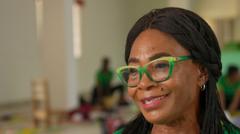In Nigeria, a compounded crisis of inadequate neonatal care and a widespread lack of awareness about the dangers of untreated jaundice persistently affects countless children. One such case is that of 22-year-old Babatunde Fashola, commonly known as Baba, who suffers from cerebral palsy and relies on continuous care. Following abandonment in infancy, Baba was embraced by the Cerebral Palsy Centre in Lagos, which dedicates itself to providing support for children with his condition.
The issue is stark, with estimates suggesting that cerebral palsy is one of the most frequently diagnosed neurological disorders in Nigeria, and its prevalence is often attributed to untreated neonatal jaundice—an ailment commonly found in infants. Neonatal jaundice occurs due to an accumulation of bilirubin, resulting in yellowing skin. While most cases resolve without intervention, the lack of timely treatment in Nigeria has dire consequences. According to medical professional Chinyere Ezeaka, a significant percentage of infants suffering from severe jaundice face the risk of lasting brain damage and the onset of cerebral palsy if they do not receive treatment within the first ten days of life.
Complicating matters, Nigeria assumes a poor ranking concerning facilities dedicated to the care of neurological disorders, leaving only three cerebral palsy centres across a nation of over 200 million. These centres, like the one founded by Nonye Nweke, operate on limited funding and bear the burden of an extensive waiting list. Nweke's motivation to create the centre arose from her personal journey with her daughter, Zimuzo, who was diagnosed with cerebral palsy at a young age.
"I decided to keep her and began researching. She's my life," Nweke expressed, reflecting a commitment that extends to other children in need of care. As she leads the centre, she continues to confront logistical challenges, as the monthly cost of care exceeds $1,000 in a country where the minimum wage hovers around $540 annually.
Cultural beliefs also pose barriers; many families in Nigeria fear stigma, associating cerebral palsy with spiritual damage, leading to some children being ostracized or abandoned. Nweke, who has bravely forged a path for herself and her daughter, seeks to dismantle harmful myths that obstruct treatment.
Support is emerging, however, in the form of initiatives like the Oscar Project, which aims to improve diagnosis and treatment for neonatal jaundice in Lagos. Named after Oscar Anderson, who experienced cerebral palsy due to untreated jaundice, the initiative hopes to equip local healthcare providers and educate mothers about prevention and early intervention. With aspirations to screen newborns for jaundice and reduce the burden of debilitating health conditions, the Oscar Project serves as a beacon of change.
While hope skims the surface of these efforts, the challenges to enact widespread change remain immense. Anderson asserts the determination to ensure all newborns receive necessary treatments, declaring, "The work doesn't stop until every baby is protected against neonatal jaundice."
The plight of those dealing with cerebral palsy in Nigeria underscores a critical need for systemic change in neonatal health care, a battle spearheaded by advocates like Nweke and programs like the Oscar Project. Only through increased awareness and accessible treatment can the cycle of heartbreak and tragedy be broken for many Nigerian families.
The issue is stark, with estimates suggesting that cerebral palsy is one of the most frequently diagnosed neurological disorders in Nigeria, and its prevalence is often attributed to untreated neonatal jaundice—an ailment commonly found in infants. Neonatal jaundice occurs due to an accumulation of bilirubin, resulting in yellowing skin. While most cases resolve without intervention, the lack of timely treatment in Nigeria has dire consequences. According to medical professional Chinyere Ezeaka, a significant percentage of infants suffering from severe jaundice face the risk of lasting brain damage and the onset of cerebral palsy if they do not receive treatment within the first ten days of life.
Complicating matters, Nigeria assumes a poor ranking concerning facilities dedicated to the care of neurological disorders, leaving only three cerebral palsy centres across a nation of over 200 million. These centres, like the one founded by Nonye Nweke, operate on limited funding and bear the burden of an extensive waiting list. Nweke's motivation to create the centre arose from her personal journey with her daughter, Zimuzo, who was diagnosed with cerebral palsy at a young age.
"I decided to keep her and began researching. She's my life," Nweke expressed, reflecting a commitment that extends to other children in need of care. As she leads the centre, she continues to confront logistical challenges, as the monthly cost of care exceeds $1,000 in a country where the minimum wage hovers around $540 annually.
Cultural beliefs also pose barriers; many families in Nigeria fear stigma, associating cerebral palsy with spiritual damage, leading to some children being ostracized or abandoned. Nweke, who has bravely forged a path for herself and her daughter, seeks to dismantle harmful myths that obstruct treatment.
Support is emerging, however, in the form of initiatives like the Oscar Project, which aims to improve diagnosis and treatment for neonatal jaundice in Lagos. Named after Oscar Anderson, who experienced cerebral palsy due to untreated jaundice, the initiative hopes to equip local healthcare providers and educate mothers about prevention and early intervention. With aspirations to screen newborns for jaundice and reduce the burden of debilitating health conditions, the Oscar Project serves as a beacon of change.
While hope skims the surface of these efforts, the challenges to enact widespread change remain immense. Anderson asserts the determination to ensure all newborns receive necessary treatments, declaring, "The work doesn't stop until every baby is protected against neonatal jaundice."
The plight of those dealing with cerebral palsy in Nigeria underscores a critical need for systemic change in neonatal health care, a battle spearheaded by advocates like Nweke and programs like the Oscar Project. Only through increased awareness and accessible treatment can the cycle of heartbreak and tragedy be broken for many Nigerian families.


















